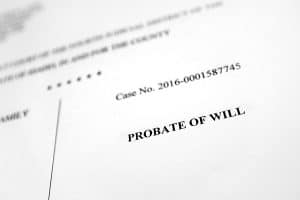Menu
Principal Office, Houston Texas Remote Services, Texas and Florida
(by appointment only)
713.568.8600
(by appointment only)
713.568.8600 | 904.425.9046


Wrongful death lawsuits and probate proceedings are both civil legal matters that occur after somebody has died.
When the death of a loved one is caused by another individual or entity, it can lead to the filing of a wrongful death lawsuit and, ultimately, the awarding of compensation to surviving family members. Probate is a court proceeding that deals with administering a decedent’s estate, inventorying their accounts and property, paying off creditors, and making distributions to heirs or beneficiaries.
While probate proceedings are fairly common when a person dies, very few deaths give rise to a wrongful death claim. However, wrongful death and probate can intersect if somebody dies due to another’s misconduct.
State laws vary on who has the legal authority to file a wrongful death case. There is also considerable state variation on how the proceeds of a wrongful death claim are distributed to survivors.
A wrongful death, as the term implies, is a death that results from the “wrongful” action of another, such as negligence, carelessness, recklessness, or intentional conduct.
Both individuals and entities, such as businesses and governments, can commit a wrongful action that leads to death. For example:
Wrongful death is a matter of civil law, although in some cases—perhaps most famously the O.J. Simpson case—a person’s death can lead to both criminal and civil charges.
 A wrongful death lawsuit can award damages to pay for the decedent’s medical bills, pain and suffering, and funeral expenses. It can also provide money to survivors for their economic and emotional injuries, such as loss of financial support, household services, and love and companionship.
A wrongful death lawsuit can award damages to pay for the decedent’s medical bills, pain and suffering, and funeral expenses. It can also provide money to survivors for their economic and emotional injuries, such as loss of financial support, household services, and love and companionship.
The question of who can file a wrongful death lawsuit comes down to state law. Generally, states allow one of the following to sue:
In states where survivors are allowed to sue for wrongful death, the right to file suit is typically prioritized based on the closeness of the relationship, with a surviving spouse and children given priority.
Some states allow groups of survivors to sue. Others give priority to family members and give them a limited amount of time to file a lawsuit, and, if they fail to do so, additional relatives and even unmarried domestic partners can then sue.
There are also certain states where only the decedent’s probate estate can file a wrongful death lawsuit. In these states, the personal representative of the probate estate (for example, a family member or a lawyer) is the only party who has the legal authority to act on behalf of the estate and file the lawsuit. The personal representative of the probate estate might be someone who was named in the decedent’s will or appointed by a judge according to state law if the decedent died without a will.
Probate is not always necessary when someone dies; there are instances when the value of the decedent's money and property is small enough to avoid probate, or the family uses estate planning tools such as living trusts to avoid it.
Wrongful death claims, as previously mentioned, are relatively uncommon. In 2022, there were just over 227,000 preventable deaths caused by injuries nationwide and not all of these were wrongful deaths.[1]
Even if a person has no accounts or property or if their estate is otherwise eligible to skip probate, numerous factors can make opening an estate and filing for probate necessary to resolve a wrongful death claim.
Here are some areas where a wrongful death claim overlaps with opening an estate and engaging the probate court:
To summarize, if a wrongful death lawsuit is filed, it is likely to trigger probate and court involvement considerations in one way or another. The specific ways in which wrongful death and probate intersect, however, are largely dependent on state law.
Determining who benefits from a wrongful death settlement or jury verdict, like other aspects of a wrongful death lawsuit, comes down to state statute.
The different ways that states approach the distribution of damages awarded in a wrongful death lawsuit include the following:

As these examples show, there is a high degree of variability among states about wrongful death lawsuit award distributions. States may give significant latitude to family members to decide how the proceeds should be split or strictly adhere to statutory provisions.
States also vary on the types of damages that can be awarded in a successful wrongful death claim. Most state laws allow economic and noneconomic damages to be recovered, but they may give itemized descriptions of the specific damages that can be awarded to particular survivors and distinguish between damages recoverable by survivors and recoverable by the estate. In some states, each heir must present evidence to the court of their losses to receive a share of the wrongful death damages.
Closing the book on a loved one’s estate can be procedurally complicated and emotionally difficult no matter the circumstances of their death, but if their passing also involves a wrongful death claim, the situation can become much more emotional and increasingly complex.
Whether you are a personal representative or family member responsible for filing a wrongful death lawsuit, an heir seeking to claim a portion of a wrongful death payout, or you want to make sure that your estate plan anticipates the possibility of a wrongful death and addresses how to best deal with it, we can help with the probate side. And we also know personal injury attorneys we can refer you to for the wrongful death claim, if one is needed.
© 2025 McCreary Law Office, PLLC